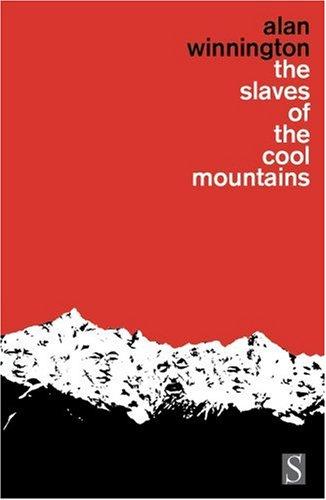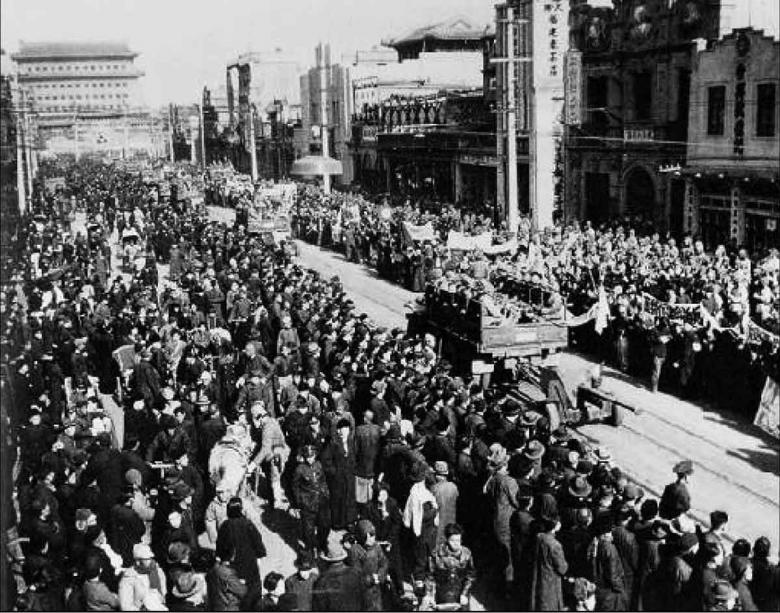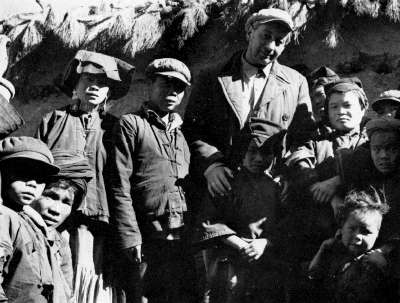Short-circuiting history in China
The Slaves of the Cool Mountains by Alan Winnington
Review by Gina Nicholson
When considering the task of building socialism, one naturally thinks first of the problems involved in transforming capitalist society – the economics, the entrenched capitalist powers, and the ingrained attitudes in the mass of the people. But additionally the new Chinese People’s Republic, and the Chinese Communist Party (CCP), faced older problems than capitalism.
In his astonishing and fascinating book The Slaves of the Cool Mountains, Alan Winnington told of the extraordinary conditions existing in the far south west of China, in the almost inaccessible Cool Mountains and along the border with (then) Burma; and the necessarily thoughtful and flexible approaches of the CCP workers to the situations they found there.
In 1957 Winnington travelled first – by horseback and (mainly) on foot - to the land of the Norsu people in the Cool Mountains. This was a seven-day journey from Kunming, the capital of Yunnan province. There the People’s Liberation Army (PLA) had come across a slave-owning society, with some elements of feudalism; a people fiercely territorial and imbued with a hatred and contempt for the Han Chinese. Periodically the Norsu warriors had descended from their mountain fastness to capture Han Chinese and take them back as slaves to their own villages.
What had evolved was a system entirely dependent upon slave-owning. In one area – which was agreed to be typical – Winnington obtained the following figures:
Households Individuals
Nobles 30 123
Bondsmen 825 3,737
Separate-slaves 358 1,426
House-slaves 0 955
Bondsmen themselves – and even separate-slaves – could, and did, also own slaves.
Apart from the nobles, most people lived at subsistence level and production from the land was very low. Usury was common and crippling – inability to pay debts was a way even Norsu people themselves could become slaves.
In the past the Han Chinese had ruthlessly oppressed and exploited the Norsu and other peoples. Furthermore the Kuomintang, losing the war against the PLA, recently had pillaged, raped and killed in this area. This had a mixed effect for the PLA, who were, of course, Han Chinese. They were initially viewed with hostility and suspicion, but they paid for everything they needed and behaved well and courteously. Thus people began, grudgingly, to trust them.
The CCP workers explained to Winnington how they had negotiated with the Norsu slave-owners a peaceful transition to more advanced social relations. The young Chinese state put enormous resources into compensating the relatively rich so that they could maintain their standard of living while freeing their slaves. It was bribery; but since most of the former slave-owners understood (a) that their own living conditions would improve and (b) there really was no alternative, it worked, albeit not without some difficulties. Where a few nobles resisted, their slaves tended to run away or even, in at least one case, killed their owner’s sheep and went on strike.
Of course, many slaves, once freed, had difficulty in developing initiative or a will to work. Dealing with this problem involved developing learner-households, often led by a CCP worker. Nevertheless, by 1957 when Winnington visited the Norsu, the transformation was well advanced.
The Wa people, described as headhunters in the Encyclopedia Britannica, had developed a similarly protected social system. Here, on the Burmese border, surrounded by jungle, their villages were as simple to protect as were the Norsu on their mountains. Each Wa village was surrounded by dense thornwood and could only be entered through a well-defended tunnel.
“This region was never under even nominal control by Chiang Kai-Shek or previous Chinese rulers, but because it is remote and marches with the north Burma jungle, large numbers of Kuomintang soldiers fled here as the People’s Liberation Army pressed down from the north and east in 1948 and 1949. Jabuei, the . . . leader of the Wa, spent most of his time in those years organising the Wa people to fight and destroy these remnants, disorganised troops who hid in the jungle and made raids on the Wa villages for food, women, liquor and opium. He led the Wa in battles that wiped out hundreds of them until the Kuomintang forces in the area were reduced to fewer than 100 men.” (Chapter 12).
When the PLA arrived in this area they found a half-starved people who lived on the jungle most of the time. What farming there was remained extremely primitive. Children went naked until the age of 11 or 12, and adults “wore nothing but a strip of cloth”.
Only about five per cent of the Wa were slaves when the PLA arrived. A good reason for this is that the level of production was so low that a slave could produce little more than was needed for his own maintenance. The elders reported that slavery had only existed among them for some 60 years. Unlike among the Norsu, Wa slaves had full civic rights and could vote. Once a slave married he or she was automatically freed.
Headhunting was a problem, but not normally practised upon foreigners or influential people in their own communities. The sorcerers required sacrifices, sometimes of human heads, in order to mediate with the ‘ghosts’ to allow the crops to grow, or to cure diseases. On one occasion not long before Winnington arrived, a young man, egged on by sorcerers and older men, went to a neighbouring village and cut off the head of a man living there. He expected to be hailed as a hero; but other wiser people, who were committed to the newly prosperous life being developed with the aid of the CCP workers, saw that this would make unnecessary difficulties with the neighbour village and set a bad example. Headhunting died out fairly quickly and easily.
As with the Norsu, malaria and other diseases were common and the sorcerers gained prestige and goods by claiming to attempt cures by supernatural intervention. The modern medicines which the Chinese government made available were useful in countering this superstitious practice.
Also like the Norsu, the Wa people suffered from feuds between families.
“Among the Wa it is traditional that you cannot settle anything without a drink, and you cannot settle anything when you are drunk. This leaves a remarkably small margin of time when anything can be settled. It is always easier to start a feud than to end one.” (Chapter 13)
The Wa had no respect for human life, and many coveted the modern weapons the newcomers carried. Life was difficult for a time; however “Communist work-teams were able to live inside the barricades of a few selected villages, build houses and settle down under the sighing bamboo”(Chapter 13) and gently pursue their work of bringing the Wa into the twentieth century.
The third people visited by Winnington posed a different problem from the two previous ones, who had already advanced some way in class society. “Happy-go-lucky and improvident, the Jingpaw people feast recklessly when food is there, drink, sing, play and sometimes fight, letting tomorrow look after itself.” (Chapter 18).
Only just emerging from a classless society – primitive communism – the Jingpaw resisted the introduction, for example, of payment for work done.
The PLA “had a stringent rule . . . that not one thread of cotton [might] be taken from the public without payment. This rule was not a political asset among the Jingpaw. They regarded insistence on paying for things as a sign of ‘bad heart.’” These people feasted while anyone had food, and afterwards subsisted on picking “a bare living from the jungle”. However, no doubt helped by contact with other more advanced people, feudalism was beginning to grow, and at a fairly rapid pace. The problem that confronted the political workers was how to bridge the gap between this primitive way of life and what was going on in the rest of China.
Hostility to the Hans, belief in sorcery, and the lack of practical education through experience of class society, were among the obstacles the political workers had to overcome. The Chinese state provided massive relief and aid goods. But the political workers felt that this society had to move in the direction of producer co-operatives.
“’. . . rather naively,’ said one worker, ‘we had at first imagined that the primitive communal way of life – with collective working and division of the crop among those who work the land – would be helpful in setting up producer co-operatives. Actually we found that exactly the opposite was true.’” (Chapter 19)
Added to nervousness of this “new-fangled nonsense” were low attendance at work and primitive egalitarianism.
Low attendance was for a variety of reasons. Birthdays were not counted every year, but every six days, and no-one worked on his birthday. Nor was any work done on the anniversary – similarly marked - of the death of a relative. Further holidays were for marriages and for “the time-consuming requirements of love-making.” (Young unmarried people were free to engage in promiscuous sex).
Then distribution of the harvest according to work done came up against the staunch collective conscience of these people. Those who received more, by virtue of more work done, felt selfish and isolated; those who had less felt they were being robbed. Nevertheless, by degrees and because production, and therefore the general standard of living, did in fact grow, the producer co-operatives gradually succeeded.
In his conclusion Winnington describes the method applied to the Norsu as ‘Reform by Peaceful Negotiation’ as a result of which there is an intervening stage before the advance to socialism, during which the land is privately owned and worked. Among the Wa and the Jingpaw, however, it was possible to apply a different method, that of ‘Direct Transition to Socialism’ because among these people the class divisions were unclear or of little importance. The main task in such cases, despite the obvious difficulties, was of raising the level of production. He notes that all over China minority peoples were undergoing similar processes to the three that he visited.
All quotations from ‘The Slaves of the Cool Mountains’

Alan Winnington
Born in London in 1910, he joined the Communist Party in 1934.
He spent six years as chief sub-editor of the Daily Worker. In 1948 he was sent to China, where he rapidly became an internationally significant foreign correspondent, and he was with the victorious Chinese Communist Party leadership as the People's Liberation Army entered Beijing in 1949.
From 1950, he was one of only two Western journalists to observe the Korean War from the North Korean side. His factual reporting of the experimental use by the Americans of bacteriological warfare outraged that country’s leadership.
He was branded a traitor by the media and in 1954, at the end of the Korean War, when Winnington expected to be able to travel home, the British Government simply refused to renew his passport. Thus, he was stranded abroad, unable to travel except within the socialist bloc, and lived in exile for the next 20 years. The decision to ban him from receiving a passport was not lifted until 1968.
Winnington spent his remaining years in the German Democratic Republic. He died on 26th November 1983 aged 73.


1949: soldiers of the People's Liberation Army enter Beijing

Alan Winnington with some of the slaves he met.






